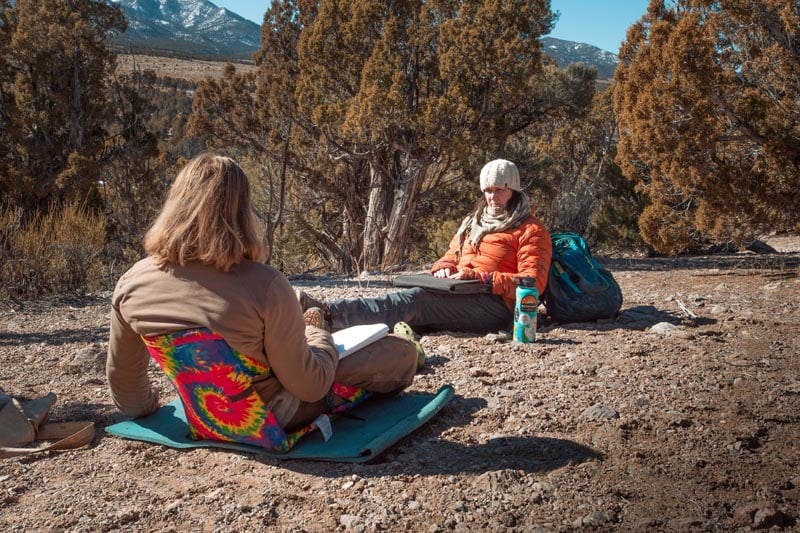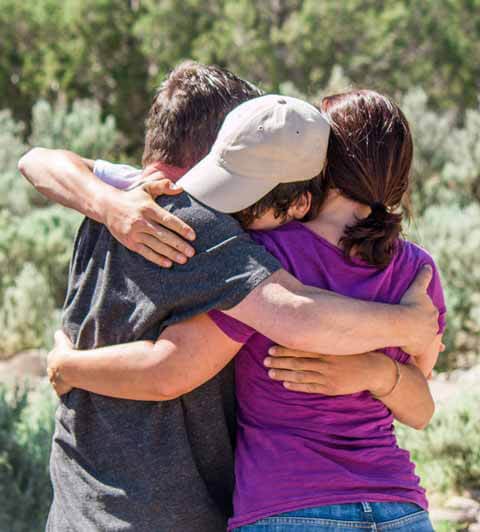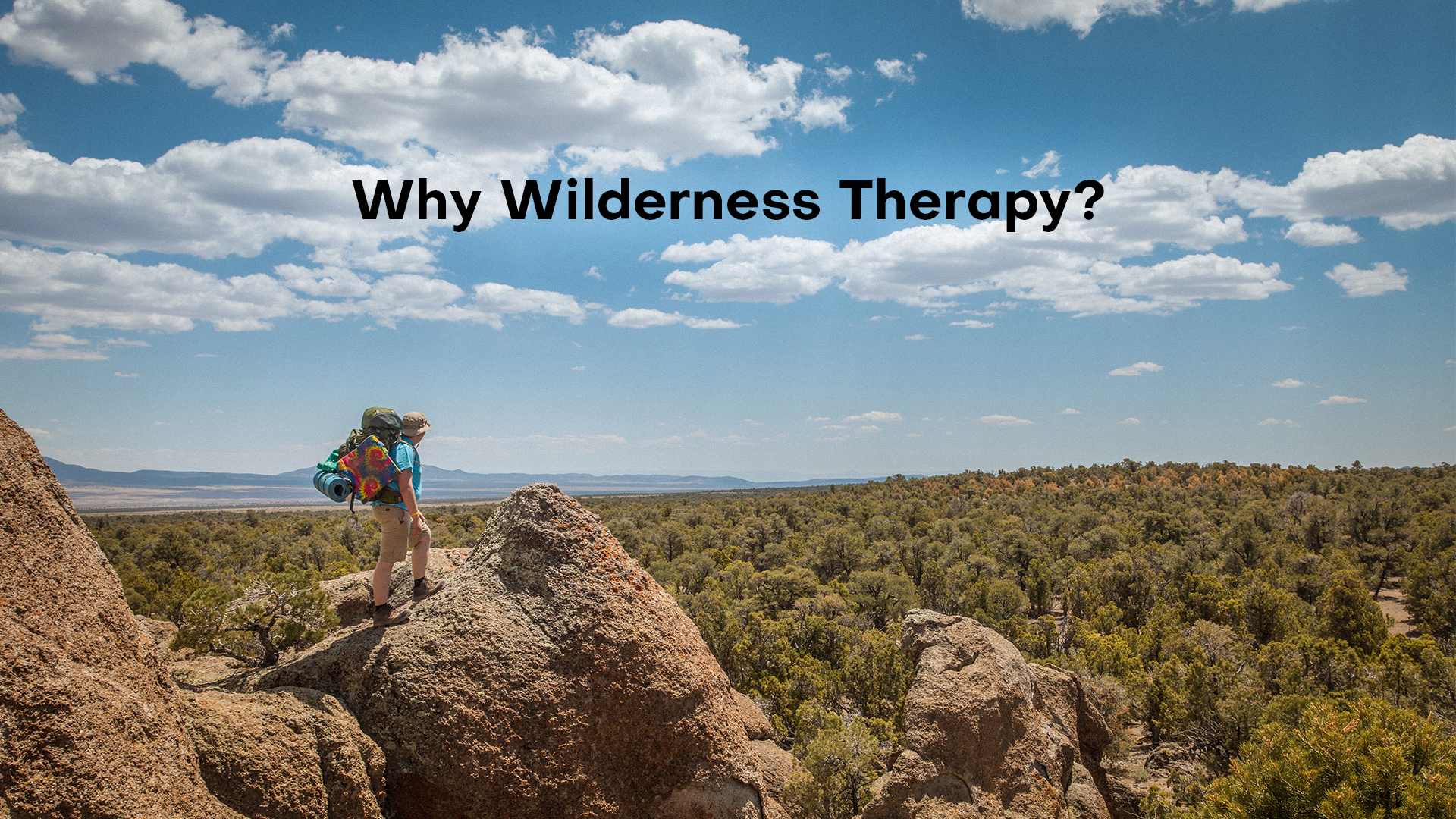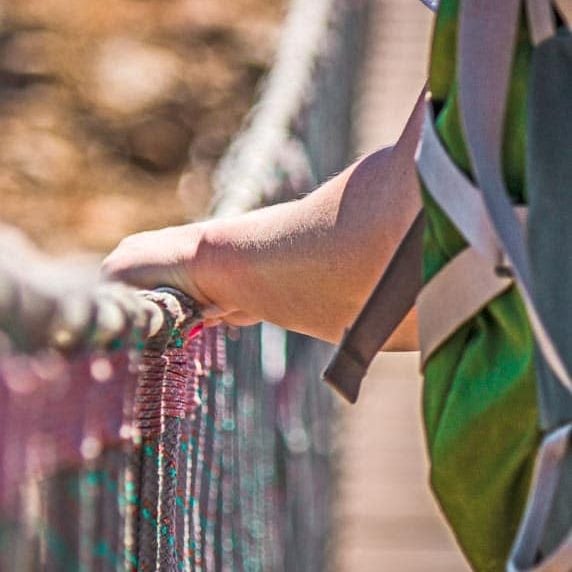
Classic boot camps are often depicted as having strict rules, drill instructors, and extreme physical challenges. Often, someone’s image of a juvenile boot camp is that of Marine Corps basic training. One thing that is very clear in this depiction is that it doesn’t look like a summer camp. The idea for private boot camps originated from military boot camps that were designed to prepare soldiers for war. A military boot camp’s intent is to harden civilians into soldiers to engage in combat. Military-style boot camps push recruits to fall in line, take orders, and train them to endure the trauma that accompanies war.
Boot camps for kids share some of these components. They are designed to “toughen up” their residents. They do this through a strict set of rules and punishments. These can include rising before dawn, extreme physical activity, and mental manipulation. People who work at these camps take no excuses and attempt to push kids to their limits to “break” their habits.
Why Do Parents Send Their Kid To Boot Camp?
Teenagers today face an enormous amount of pressure in today’s society and sometimes struggle to handle it. It often seems like they live in a different world and have to face different challenges than generations before them. They have no memory of what the world was like without smartphones. Social media dominates social interactions. The pressure to succeed and to fit in has never been higher.
Some kids might succumb to social pressures and try to cope by drinking alcohol or falling into substance abuse. They may display oppositional behaviors like pushing back against authority figures or may struggle with academic underachievement.
Teenagers also have a hard time expressing their feelings to their parents or other adults in their life. Instead of communicating, they often display a secondary emotion – anger. This leaves parents believing that they need harsh rules and structure like a boot camp experience to correct these behaviors.
Unfortunately, strict discipline isn’t always a good thing for kids who are struggling. There may be underlying mental health issues like anxiety and depression. According to the CDC, for children aged 3-17 years with behavior problems, more than 1 in 3 also have anxiety and about 1 in 5 also have depression. Helping your kid with underlying mental health conditions may require mental health treatment to help correct their behavior.
Who Goes To A Kids Boot Camp?
You might be wondering if your child would qualify for an intervention like teen boot camp, military school, or other similar programs. Maybe you are seeing some behaviors and are on the fence about if things have gotten “bad enough.” Typically boot camps have low selection criteria and are parent-driven. This means that most participants are there against their will.
Issues That Teens Struggle With:
- Behavioral Problems
- Substance abuse
- Trouble with the law
- Defiance
- Issues at school
- Anger outbursts
- Disrespecting authority
- Dangerous or bad behavior
It is not an easy choice to “send your child away.” Many parents do so because they feel that they are unable to keep their child safe and that extreme measures must be taken. Your child’s actions and behaviors may have you feeling that you have to do something about them before they spiral more out of control. You may be asking yourself how I can help my struggling teen? While signing your child up for a boot camp experience is one option to address behavioral issues, other options have been proven to be more effective.
Wilderness therapy is an alternative to boot camp for kids that is researched backed | RedCliff Ascent
How Can I Help My Troubled Teen?
When parents start to feel that extreme measures need to be taken to keep their child safe, they often think a boot camp setting would be right for them. They may believe that their child needs “tough love.” Sometimes that is the case, where a teen can benefit from having more structure and accountability, but there also might be something else going on that is resulting in their behaviors. There could be an underlying mental illness that increased structure and discipline would not address. It could even make things worse.
If your teenager shows signs of any of the issues, it is important to consider the root cause of the problem before taking the next step. The best thing for your teen may not be a boot camp setting. There are other options like wilderness therapy that could be more effective.

Issues That Your Kid Might Be Struggling With:
- Poor Self-Esteem
- Mental Health Concerns
- Bullying
- Overwhelming Pressure to Succeed
- Learning Challenges
- Self-Harm
- Oppositional Defiant Disorder (ODD)
- Drug Abuse
If your teenager shows signs of any of the issues, it is important to consider the root cause of the problem before taking the next step.
What Are Boot Camps Designed To Do?
Boot camps are designed to instill discipline through structure. Many parents believe that their kid will improve with a firmer hand. They think that they have been “too soft” as a disciplinarian and that this has led to problem behaviors.
Benefits You Might Be Looking For:
- A Strong Work Ethic
- Purpose
- Sense of Belonging
- Structure
- Discipline
- Respect
While parents have the right intentions, sending a troubled teenager to a boot camp can cause more harm than good. Instead, an alternative treatment that addresses the causes of behavior can often be more appropriate.
Boot camps are often a poor choice for addressing behavioral issues because they can create trauma rather than treating the root cause. Generally, behavioral problems are rooted in a struggle with mental illness. Sending your child away to a boot camp program where they are subjected to strict discipline does not address them. Instead, the act of sending your child away is likely to cause mental and emotional trauma. The whole process seems like a punishment when they are already struggling. Alternatively, a non-punitive program is likely to be a better option for your child.
You Are Not Alone
RedCliff Ascent is there for you and your family.
The Problems Associated With Boot Camps For Troubled Teens
Boot camps for teens are known for creating extreme environments for their participants. Although these types of programs have been around since the 1880s, they have not proven to be effective for helping teenagers. Boot camps do not address the underlying issues that lead to problem behaviors. To address these issues, advanced clinical assessments and interventions are necessary. These types of interventions are generally not available in boot camps. Instead, they are available in a wilderness therapy program.
Ultimately parents want what is best for their child. Boot camps are designed to “toughen them up” or scare them straight. This can sound appealing, but many parents of boot camp teens find themselves facing the same and often worse issues when their child returns home from a boot camp setting. Toughening someone up isn’t effective at addressing clinically complex mental health issues.

Meeting The Unique Needs of Teenagers
Teenagers have unique needs, especially when it comes to their mental health and wellbeing. Kids today are faced with many unique challenges and often have different struggles than adults.
Currently, 1 in 5 young people suffer from a mental illness. Additionally, half of all mental health conditions start by 14 years of age, but most cases are undetected and untreated. This is why early intervention and screening is important for teens. Teens also face a higher stress and more competitive environment than ever before. It is therefore not surprising that high school students today have more anxiety symptoms and are twice as likely to see a mental health professional as teens in the 1980s. When adolescent mental health conditions like these are not addressed, they can extend into adulthood and limit a child’s ability to lead a successful life. This further reinforces the importance of mental health treatment for struggling kids.
Mental health treatment for teens needs to be designed to meet the unique needs of this population. Whether it is academic considerations or a mental health professional that is experienced working with youth, teens will get the most benefit out of treatment if that treatment is tailored to their age group.
How Can I Best Support My Teen?
Your teen could be struggling with a variety of issues. One of the most important steps is to get an accurate assessment from a mental health professional to help understand what those struggles are precisely.
Overall, kids should develop 5 core competencies that can lead them down a healthy path.
Identity Development
Teenagers strive to find a clear concept of who they are, their values, and where they fit into the social world. Many young people find that they struggle to define these areas and may fall behind in terms of identity development. Formulating these aspects of their identity has been shown to lead to greater success and happiness for teens.
Self Efficacy
Self- Efficacy is the belief that someone has about their abilities. Foundational research on self-efficacy indicates that efficacy beliefs are one of the best predictors of future performance. By choosing a program that aids in the development of self-efficacy like a wilderness program, you can improve your child’s chances of success.
Life Skills
One of the main goals of many boot camp alternatives is developing healthy coping strategies and social skill-building. When teens are given a chance to learn and practice these strategies and skills, it can help them make changes in attitude and behavior and develop strong social skills.
Growth Mindset
Growth Mindset is a belief that one’s talents and abilities can improve. People with a growth mindset believe that with effort and hard work, they can succeed.
Grit
Grit is defined as the “combination of perseverance and passion toward long-term goals.” In short, grit is: finishing what you start, being consistent, and putting in the hard work to succeed. Teens who have grit are more likely to find success. Check out the video below to learn more about grit.
Alternatives to Boot Camp For Kids
It is a difficult decision when to have to send your kid somewhere to get help. When you are facing this difficult decision, it is essential to consider all the options. Other types of therapeutic programs include:
Residential Treatment Center
These are mental health treatment facilities where patients live while engaging in various therapies. Residential programs are, by definition, inpatient programs. Critically, these programs take place outside of a hospital setting in a designated facility. Treatments include traditional talk therapy, group therapy, and living in a structured and often highly supervised environment.
Boarding School
This option removes your child from their environment and introduces them to a new one with a new social network and structure. While a new environment can be beneficial, a boarding school will not address underlying issues and can lead to behavior relapses, especially on home visits.
Therapeutic Boarding School
These are live-in facilities that offer education and mental health treatment for residents. Therapeutic boarding schools are for teens that struggle with behavioral problems and emotional challenges. They can also address cognitive learning challenges and have a more holistic approach than the traditional school environment. Often, therapeutic boarding schools require prospective students to have completed an assessment program like wilderness therapy to determine whether they are a good fit for the school.
Wilderness Therapy
A wilderness therapy program is a mental health treatment strategy that combines therapy with challenging experiences in an outdoor wilderness environment. Many programs like RedCliff Ascent are research-backed and accredited. These programs go beyond talk therapy and have individualized treatment plans for adolescents with maladaptive behaviors like substance abuse, anxiety, depression, and other mental health disorders. A wilderness therapy program like RedCliff Ascent can include a wilderness therapy model. These programs leverage high adventure activities like mountain biking, rock climbing, skiing, and canyoneering to assess and treat various mental and behavioral health conditions.
What to Look For in Programs For Troubled Youth
There are several boxes that you should look to check when considering an at-risk youth program. Programs that are the most effective use what is known as a relational approach. They do not use punitive measures to motivate teens but instead guide them in finding the internal motivation to change behaviors. It would be best if you also looked for programs that offer individualized treatment plans that can be tailored to your child’s unique needs. These will be more effective at helping your child get back on track.
Another essential question to ask is if the program is accredited. Several organizations, like The National Association of Therapeutic Schools and Programs and The Association of Experiential Education, provide comprehensive standards for common practices in the industry. Programs that meet these standards are known for following safe and ethical practices so that you can be confident in making a safe choice for your child. Lastly, programs that incorporate wilderness exposure into their programming, like RedCliff Ascent, have proven to be effective in helping teenagers overcome many challenges they face.
Benefits of Wilderness Therapy:
- A decrease in symptoms of anxiety and depression
- Increased self-efficacy
- Improved executive functioning
- Improved interpersonal skills
- Identity development
- Improved grit
- Trauma resilience
- Learning to self-advocate
- Accurate clinical assessments
What is the Youngest Age For a Kids Boot Camp?
Bootcamps are a variety of costs depending on the length of the program. Boot Camps typically cost between $5,000 and $10,000 for the 30-day stay. However, as mentioned throughout this article, boot camps do not create lasting change and are not necessarily a sound investment in your child’s future. It is worth investing in a high-value program like wilderness wilderness therapy that is researched, backed, and accredited.
While costs associated with wilderness therapy are likely higher than those of a bootcamp, these programs provide a greater value because they create lasting change by addressing the root causes of problem behaviors rather than coercing change through punitive measures.
Why Choose Wilderness Therapy?
Wilderness Therapy is a unique and dynamic way to break through boundaries and create lasting change. Programs that implement a wilderness therapy model like RedCliff Ascent can create challenges for students so they can start to forge an identity, build resiliency, and improve self-efficacy. When this is combined with traditional therapeutic methods like individual and group therapy, it is a powerful combination.
Wilderness therapy programs like RedCliff Ascent provide comprehensive, clinically sophisticated treatment in concert with adventure activities. This allows clinicians to get past symptoms and address the root causes of problem behaviors for adolescents and young adults. Wilderness therapy has been shown to improve self-efficacy through a process by which youth are exposed to seemingly impossible challenges in novel environments. Through guidance, hard work, and grit, they can find success. This approach is more effective than boot camps, which use behavioral modification models that only address behaviors and do not have a holistic approach.
Further, wilderness programs can address the issues in an individualized way. They are not one size fits all approach and include the whole family in the process.
Finally, with the combination of services provided at programs such as RedCliff Ascent, teenagers experience lasting change.

What is Wilderness Therapy?
Wilderness therapy is a type of treatment for teens that uses nature, wilderness activities, and therapy as a means to address and heal. Wilderness therapy takes full advantage of the outdoors and its ability to foster change. The outdoors provide teens with a contrasting environment to observe aspects of themselves that are often overlooked in traditional talk therapy.
As the leader in wilderness therapy, RedCliff Ascent is an effective treatment program for struggling teens aged 13-17. RedCliff Ascent’s safe, nurturing, and supportive environment provides teens the skills they need to cope in a healthy and age-appropriate way.

Benefits of Wilderness Therapy for Teens
Being immersed in nature can have a profound impact on a teenager. It improves their mental, emotional and physical health. When combined with a research-backed clinical approach, a therapeutic wilderness experience helps teens heal from depression. Here are five specific benefits your family can expect to see while your teen is in wilderness therapy.
Research indicates accurate mental health assessments can lead to a 20% reduction in treatment.
Wilderness therapy provides a novel and challenging environment that disrupts the unhealthy patterns that cause your teen's mental health struggles.
Teens living with severe depression often struggle to engage in ongoing treatment and have very high dropout rates. Poor engagement may lead to worse clinical outcomes, with symptom relapse and rehospitalization. Our research shows that even teens who have been resistant to therapy engage in the process while in wilderness therapy.
RedCliff Ascent’s safe, nurturing, and supportive environment provides teens with the social and emotional learning skills they need to re-engage in healthy development.
If you're like most parents, you don't want to just get rid of your teen's mental health issues. You want them to eventually become thriving, independent adults equipped with the skills necessary to be successful outside your home. These include:
Resilience - the ability to successfully adapt to challenging situations despite risk and adversity. Resilience helps us develop social competence, problem-solving skills, critical consciousness, autonomy, and a sense of purpose.
Leadership & Social Competence skills include qualities such as:
- responsiveness, especially the ability to elicit positive responses from others;
- flexibility
- empathy
- communication skills
- and a sense of humor.
Problem-solving skills - the ability to plan; to be resourceful in seeking help from others; and to think critically, creatively, and reflectively.
Autonomy is having a sense of one’s own identity and an ability to act independently and to exert some control over one’s environment, including a sense of task mastery, internal locus of control, and self-efficacy. The development of resistance (refusing to accept negative messages about oneself) and of detachment (distancing oneself from dysfunction) serves as a powerful protector of autonomy.
Sense of Purpose and a belief in a bright future, including goal direction, educational aspirations, achievement motivation, persistence, hopefulness, optimism, and spiritual connectedness.
98% of students report feeling connected to RedCliff's staff and one or more of their peers.
Upon completion of the program, 86% of parents reported improvement in their child's problems when compared to when they entered
12 months after treatment 86% of parents reported that their child's problems are improved since they completed treatment
How Does Wilderness Therapy Work?
RedCliff Ascent has helped teens with mental health issues for almost 30 years and has conducted research since its inception. Through our research, we have identified seven principles that actually make a difference in helping your whole family recover from your teen's mental health issues.

Healthy relationships are not only the foundation for growth and development but the launchpad for a successful future as well.
Your teen will live in a small group where social influence and feedback can be given and received in a safe and supportive way. This safe environment teaches your teen to build healthy relationships with both their peers and mentors. Having the skills to make and keep healthy relationships is essential to overcoming depression.
Treatment is most effective when it is responsive to your teen’s specific struggles, strengths, personality, sociocultural context, and preferences. Our evidence-based treatment approach combines decades of research and clinical expertise to personalize a treatment plan that fits your teen’s unique struggles, characteristics, culture, and preferences.
One common theme in feedback from RedCliff Ascent’s students is that the challenging and novel environment provided them with a new perspective on their life and everything they knew before wilderness therapy.
Novel physical environments are a place of contrast that confront the world views your teen takes for granted. This helps your teen to see with a fresh perspective and see new options available to them. Growth occurs outside of the comfort zone and is accelerated in environments that push physical and mental limits.
Your teen's mental health issues didn't develop in isolation, it affects everyone in your family. The healing process should apply to your whole family as well. Parental involvement and family support during treatment greatly increase your teen’s progress in treatment and helps them to adapt after treatment.
Communicating through handwritten letters provides a novel and powerful way to work through your family's struggles. You will also have access to our parent resource library, a weekly support call with other parents like you, as well as a weekly session with your child's therapist.
Your teen's issues fill every aspect of their life. The best treatments must treat every part of their life as well. They use a holistic and integrated approach so that every aspect of your teen's life can heal from depression. In our treatment program, mentors, therapists, doctors, nurses, academic directors, nutritionists, and everyone on your teen's treatment team will meet together each week to discuss how to best help your child.
Teens struggle to believe in themselves. By teaching basic primitive living skills, teens gain confidence in themselves that carries on to all aspects of their lives. By knowing that they are able to survive in nature, teens thrive at home, in school, and in their relationships.
A ceremony is a powerful tool that can change your teenager's life. A ceremony is a community celebration or commemoration often having symbolic importance to the people performing it. A ceremony recognizes your teen's inner growth and experiences and attaches it to a physical symbol that your teen can take with them. A ceremony can help your teen validate and internalize the growth they have achieved.
Exclusionary criteria for RedCliff Ascent include:
- Teens younger than 13 and older than 17.5
- Teens with a physical limitation, i.e. wheelchair, crutches, etc.
- Teens with conditions that need intensive medical care or monitoring, i.e. eating disorders, diabetes, etc.
- Teens with a history of violence or sexual assault
- Teens with psychosis or schizophrenia
RedCliff Ascent does not take Medicare or Medicaid.
